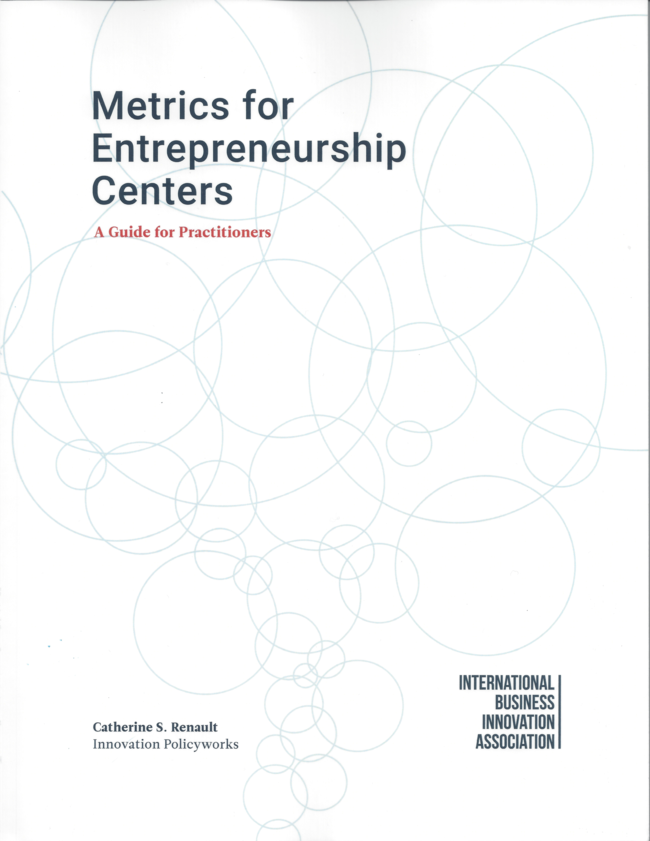|
|
|
Notes from Innovation Policyworks

The theme this month is asking questions well. This is so important, as you never learn anything if you don't ask questions. And, lots of things that you assume are true seem to be open to reconsideration. Many of the items below are reports of new research that question long-held assumptions about economic development and entrepreneurship.
For me, a question that came up this month is about which entrepreneurs should be supported by public programs. I've always advocated for high-growth, traded sector companies, rather than generic "small business." But I've recently changed my mind. We're not so great at figuring out who will become high-growth, nor which sectors could transform from locally-serving to traded.
Another relevant question is What if this fixation on "high-growth" is really just a smokescreen for supporting entrepreneurs who look like us? Entrepreneurs come in many sizes and colors, and prejudging that a minority-owned or woman-owned business is "just a lifestyle business," for instance, means that lots of opportunities are left on the table.
How about you? What do you think?
Read the whole blog post
HERE.
Cathy
|
Pennsylvania Looks for New Competitive Advantage
Back in the 1980s, Pennsylvania was one of the first states to adopt public programs to support innovation and entrepreneurship. Many of its initiatives, such as the Ben Franklin Technology Centers, have been considered "Best in Class" for decades.
A new report by Brookings looks at the situation in Pennsylvania, and makes recommendations that inform all states looking to improve their competitive position. The outcomes desired for Pennsylvania have much in common with other states, including:
- Create an evidence-based state innovation strategy
- Strengthen business R&D in the state
- Bolster state investment in early stage financing and
- Mitigate significant spatial divergence.
The
report contains brief summaries of leading programs being undertaken in other states that Pennsylvania (and others) can consider for its own future.
|

Station F: The World's Largest Startup Campus
Hint: It's
not Where You Think!
Station F launched in Paris two years ago, as French President Emmanuel Macron's vision of transforming France into an innovation powerhouse.
It is based in an old rail depot and is home to over 1000 startups and runs programs hosted by companies like Facebook, L'Oréal and Microsoft. Station F includes co-working spaces, event areas and a restaurant and is the largest of its kind in Europe. The surprise? It's a private sector initiative, owned by Xavier Niel, entrepreneur and investor. Check out this
article
from Pitchbook that details the growing popularity of France's VC ecosystem and the record amounts of capital raised.
|
 The Story of One Incubator
One year ago, the commercial kitchen and food business incubator in Portland, ME looked like it was going out of business. However, entrepreneur Bill Seretta bought the Fork Food Lab,
and it's now home to 45 food-related businesses, and the "hub of culinary creativity and entrepreneurship in Bon Appetit's 2018 "Restaurant City of the Year," according to MaineBiz. Seretta is now looking for a bigger space and trying to raise $150,000 to "cover a loss." The current building does not have appropriate manufacturing space, storage areas, parking or a loading dock. However, the community has an economic impact of $5.5 million in gross annual sales and more than 50 employees. About a third of current members make packaged consumer good, but many members and alums are food trucks that have moved into permanent locations. See the whole article
HERE.
|
Help for Distressed Communities
I'm a sucker for well-written papers by economists, and Timothy Bartik is one of the best. So, his new paper "Should Place-Based Jon Policies Be Used to Help Distress Communities" is worth reading.
In a nutshell, Bartik argues that well targeted and designed programs that encourage job growth are worth doing. However, he says, the current policies which provide long-term tax incentives to large corporations are excessively costly and poorly targeted. Instead customized business services, improved infrastructure, local education and job training should be used.
Read it
HERE.
|
Does High-tech Job Growth Trickle Down? New Study Says "No"
A new
study by Neil Lee of the London School of Economics and Stephen Clarke of the Resolution Foundation in London tracks the growth and effects of high-tech and digital industries across the United Kingdom from 2009-2015. They find that the jobs multiplier is considerably smaller than previous studies focused on the US have documented, but more in line with other European research with a multiplier of around 1.1:1. This suggests that low-skilled workers fail to benefit from high-tech growth and development and in fact that the average wage for these workers actually falls, and income is eroded further by inflated housing costs. The authors note that high-skilled tech workers are mobile and highly paid, while lower-skilled workers often lack the resources to move to other places.
|
Book Review: The Coaching Habit: Say Less, Ask More & Change the Way You Lead Forever
by Michael Bungay Stanier
Last week I did something I don't do very much anymore. I bought a real live book in a real live bookstore. Truth to tell, I was in Washington Reagan National Airport with time to kill, and went into a bookstore, rather than just downloading something to my Kindle. There's huge freedom in browsing a stack of books, and I came across this book about coaching. It was originally published in 2016, and is a Wall Street Journal bestseller.
Stanier's thesis is that there are just seven questions that you really need to ask. They are all wide-open questions that will elicit great information and deep thinking on the part of whomever you ask them of....a great outcome if you are like me and are often asked for advice. The seven questions keep us from just going on and on and rather let us help advice-seekers learn their own truths and answers. I won't give you all seven, but the first one is, "What's on your mind?" I highly recommend this quick read.
PS. Available for
FREE on Kindle, and substantially less on Amazon than in that airport bookstore. Live and learn!
|
|
| |
|
"Without a good question, a good answer has no place to go. "
Clayton Christensen, author of
The Innovator's Dilemma
|
|
Innovation of the Month: Thred Up
 Thred Up is a website that integrates the resale and retail experience. They are modernizing the process of thrifting and helping fashion retailers move to a more circular system with no waste. Its Resale-as-a-Service provides companies the processes to participate from shipping labels to store credits for customers who sell their secondhand items. Thred Up is a website that integrates the resale and retail experience. They are modernizing the process of thrifting and helping fashion retailers move to a more circular system with no waste. Its Resale-as-a-Service provides companies the processes to participate from shipping labels to store credits for customers who sell their secondhand items.
Question for You:
How will your brand build a platform that saves your industry from itself?
|
|
New to Innovation, Entrepreneurship or Economic Development?
Want to learn more about what programs work and why?
Five Strategies for Economic Development that enhance innovation and entrepreneurship.
Click
HERE for a complimentary PDF that outlines the whys and wherefores!
|
|
Creating, Building and Supporting Entrepreneurial Ecosystems: What You Can Do
Now available on Amazon Kindle!
Every community, region or state is unique. It has its own demographics, geography, history, culture, business and industry mix, assets and politics. To figure out how to create, building or grow an entrepreneurial ecosystem requires an understanding of both the framework of innovation and entrepreneurship-based economic development, and a replicable, reliable process for linking that framework to your situation.
This short book is both a quick introduction to the framework, and an overview of the process, with examples from around the US to give you inspiration.
I hope you enjoy it! If you do, please write a review! Get it HERE.
|
Metrics for Entrepreneurship Programs
 Have you been wondering how to convince your stakeholders that your program is performing well? My book on evaluating entrepreneurial programs, written for the International Business Innovation Association (iNBIA), is available on its website. The basics apply to any economic development program. Check it out HERE. Have you been wondering how to convince your stakeholders that your program is performing well? My book on evaluating entrepreneurial programs, written for the International Business Innovation Association (iNBIA), is available on its website. The basics apply to any economic development program. Check it out HERE.
|
|
Hear Cathy on WGAN's Inside Maine with Marty Grohman
 I had the most fun talking with Marty Grohman, serial entrepreneur, legislator, House candidate and now Executive Director of E2Tech. He's just as engaging in person as he is on the radio! Listen HERE. I had the most fun talking with Marty Grohman, serial entrepreneur, legislator, House candidate and now Executive Director of E2Tech. He's just as engaging in person as he is on the radio! Listen HERE.
|
|
|